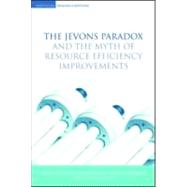The Jevons' Paradox and the Myth of Resource Efficiency Improvements
, by Polimeni, John M.; Mayumi, Kozo; Giampietro, Mario; Alcott, Blake- ISBN: 9781844074624 | 1844074625
- Cover: Hardcover
- Copyright: 1/30/2008
* Build more roads and congestion goes up, not down; improve engine efficiency and people drive more, increasing (as opposed to decreasing) emissions ' these are examples of Jevons' Paradox, and clearly illustrate its importance in modern debates around resource use * From an international team of researchers, this is the first book to tackle the issues head-on ' with special focus on the case of oil usage * Will be an essential addition to any economics, energy or resource management departmental bookshelf 'Jevons' Paradox', which was first expressed in 1865 by William Stanley Jevons in relation to use of coal, states that an increase in efficiency in using a resource leads to increased use of that resource rather than to a reduction. This has subsequently been proved to apply not just to fossil fuels, but other resource use scenarios. For example, doubling the efficiency of food production per hectare over the last 50 years (due to the Green Revolution) did not solve the problem of hunger. The increase in efficiency increased production and worsened hunger because of the resulting increase in population. The implications of this in today's world are substantial. Many scientists and policy makers argue that future technological innovations will reduce consumption of resources; Jevons' Paradox explains why this may be a false hope. This is the first book to provide a historical overview of Jevons' Paradox, provide evidence for its existence and apply it to complex systems. Written and edited by world experts in the fields of economics, technology and the environment, it explains the myth of efficiency and explores its implications for resource usage (particularly oil). It is a must read for policy makers, natural resource managers, academics and students concerned with the effects of efficiency on resource use.







